Cannes 2016: Next's VR Programming Round Up + The Quest For Monetization
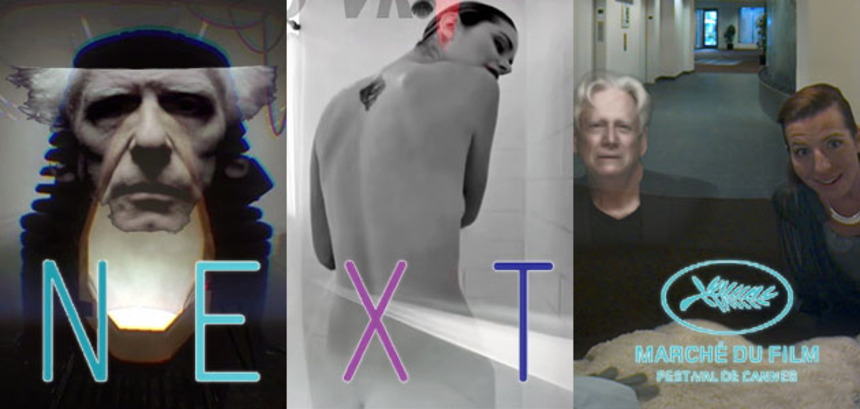
Like most major film festivals these days, Cannes has jumped into the exploration of VR programming as well. The market sidebar dubbed Next has been around for a while, but this year was expanded to a much more prominent location on a pier beside the Palais and was narrowed to focus almost exclusively on VR content. The good folks in charge did a wonderful job of lining up both excellent speakers and some very interesting content. On top of that, they exhibited the content in an innovative and exciting way.
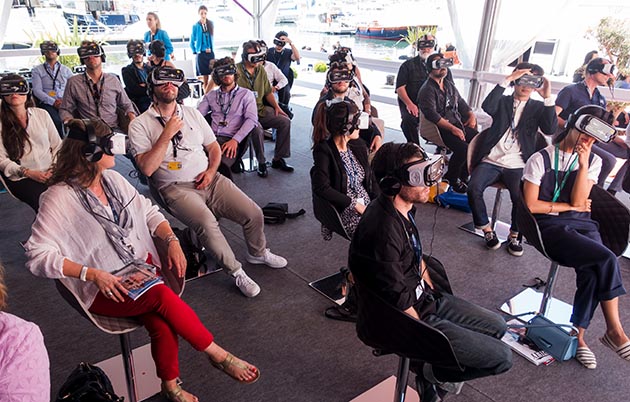 The centerpiece of the Next programming was a series of synchronized VR experiences where 30 participants watched a playlist composed of multiple VR narratives and docus. The content was grouped by nation of production and then each "screening" was followed by a panel discussion with the creators behind some of the content on display. It was an innovative format that lead to a better overall experience for the participants and helped avoid one of VR exhibition's biggest problems of people experiencing the work in loud and crowded rooms.
The centerpiece of the Next programming was a series of synchronized VR experiences where 30 participants watched a playlist composed of multiple VR narratives and docus. The content was grouped by nation of production and then each "screening" was followed by a panel discussion with the creators behind some of the content on display. It was an innovative format that lead to a better overall experience for the participants and helped avoid one of VR exhibition's biggest problems of people experiencing the work in loud and crowded rooms.
Aside from these content specific panels, Next also featured a few key panels that focused on the nitty gritty of creating narratives in VR. One of those panels was titled Virtual Reality and Cinema: Opportunities for Monetisation and dug deep into one of the biggest questions dogging VR creators today. Deloitte researcher Paul Lee predicted VR would be a $1 Billion industry in 2016 with $700 Million of that from hardware sales and $300 Million from content (mostly games). That doesn't leave a lot for VR narrative but it's a growing field (although he was quick to point out it's a blip on the radar compared to smart phone growth).
Jip Sahmoud, founder of The VR Cinema in Amsterdam and Berlin had a different approach to monetization, focusing on bringing in content from around the world and splitting box office revenue with the creators. He's had a lot of success at his cinemas and looks forward to a time where the people coming in his doors are more enthused by the stories being told than the wow factor of roller coaster experiences. The panel also featured a lively debate on if it is best to set prices for narratives now or give them away for free to avoid the problem of setting a reference price. As Penrose's Eugene Chung explained, if the reference price is set too low, the industry could see a big problem of undervaluing what's being created the way that mobile apps are stuck seeming expensive if they cost anything more than $0.99.
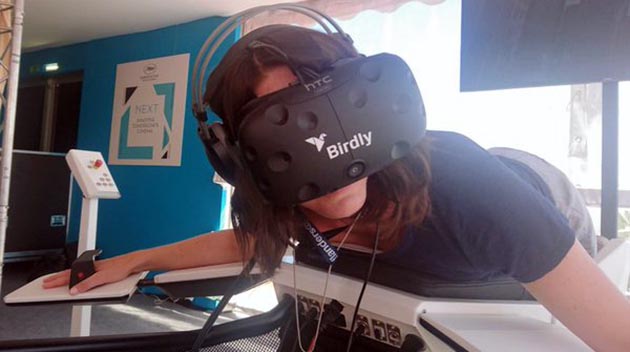 On the content side, there were quite a few interesting VR pieces to be seen. Many of them have been on display at past festivals and some have even been covered here. Birdly, which we haven't spoken about, premiered back at Sundance 2015 and has been at numerous festivals since. This full body experience straps users onto a moving table and allows them to fly through the skies, flapping their arms to gain elevation soar. Inevitably everyone also has the fun of crashing into a building or two.
On the content side, there were quite a few interesting VR pieces to be seen. Many of them have been on display at past festivals and some have even been covered here. Birdly, which we haven't spoken about, premiered back at Sundance 2015 and has been at numerous festivals since. This full body experience straps users onto a moving table and allows them to fly through the skies, flapping their arms to gain elevation soar. Inevitably everyone also has the fun of crashing into a building or two.
Both the previously lauded Invasion! by Baobab Studios' Eric Darnell (director Madagascar movies) and the live-action Defrost directed by Randall Kleiser (director of such classics as Flight of the Navigator and The Blue Lagoon) followed-up their premieres at Tribeca and Sundance respectively with screenings at Cannes Next. Both Darnell and Kleiser also took part in the The Future of VR, A US Perspective panel which focused on how established film directors are forced to rethink the ways they make movies to tell stories in VR.
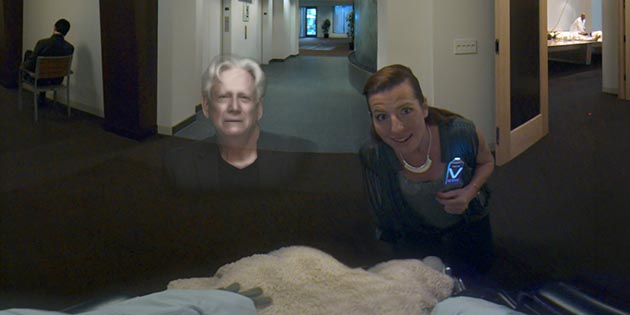 Kleiser and his partners Tanna Fredrick and Furious M's Mario Kenyon not only took part in the panel but were also on hand to debut the second episode of Defrost titled The Best Care. This episode sees the story take a big leap forward. Where the pilot just introduced us to the first-person world as a woman being awoken from a medically-induced coma in the year 2045 and coming to terms with seeing her grown up family, this new episode starts to hint at more nefarious things happening in the cryo-facility that put her to sleep. It also introduces the interesting narrative technique of a small amount of inner monologue. It will be interesting to see how this method works to advance the story as further episodes are released.
Kleiser and his partners Tanna Fredrick and Furious M's Mario Kenyon not only took part in the panel but were also on hand to debut the second episode of Defrost titled The Best Care. This episode sees the story take a big leap forward. Where the pilot just introduced us to the first-person world as a woman being awoken from a medically-induced coma in the year 2045 and coming to terms with seeing her grown up family, this new episode starts to hint at more nefarious things happening in the cryo-facility that put her to sleep. It also introduces the interesting narrative technique of a small amount of inner monologue. It will be interesting to see how this method works to advance the story as further episodes are released.
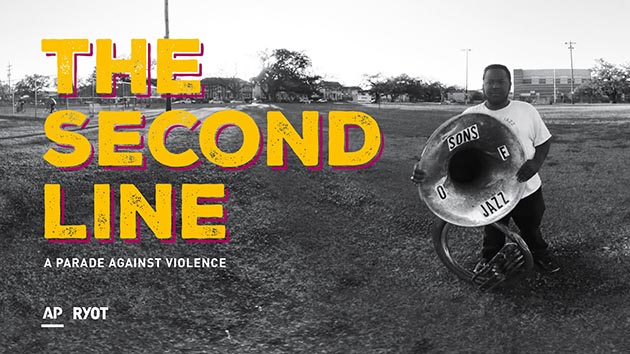 Also in the American section were too pieces by VR documentary specialists RYOT entitled Repensando a Cuba and The Second Line: A Parade Against Violence. Both piece are experiential docs that let the viewer see and feel what it's like to live in Cuba or take part in New Orleans street demonstration. The company was recently purchased by the Huffington Post and has plans to put its cameras and filmmakers are bureaus around the world to respond to news in a timely way.
Also in the American section were too pieces by VR documentary specialists RYOT entitled Repensando a Cuba and The Second Line: A Parade Against Violence. Both piece are experiential docs that let the viewer see and feel what it's like to live in Cuba or take part in New Orleans street demonstration. The company was recently purchased by the Huffington Post and has plans to put its cameras and filmmakers are bureaus around the world to respond to news in a timely way.
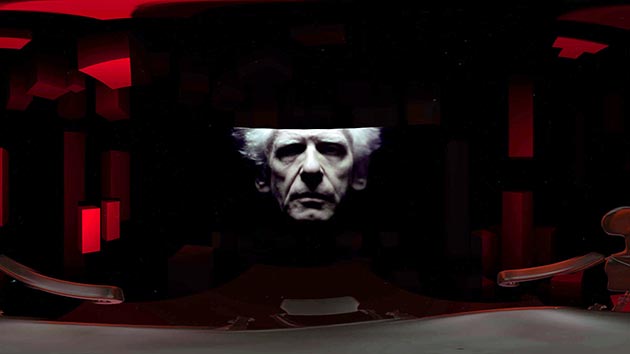 The Canadian Film Centre's Media Lab had a big representation at Next with a number of pieces in their "Canadian Genre-VR Film Series." The Body/Mind/Change Redux Teaser is a quick trip into the mind of favorite Canadian son David Cronenberg. Partially 3D rendered and part video, this piece is really just a teaser but hints at some of the weird things directors J.Lee Williams and Blair Renaud have in store for the full Cronenbergian adventure down the road.
The Canadian Film Centre's Media Lab had a big representation at Next with a number of pieces in their "Canadian Genre-VR Film Series." The Body/Mind/Change Redux Teaser is a quick trip into the mind of favorite Canadian son David Cronenberg. Partially 3D rendered and part video, this piece is really just a teaser but hints at some of the weird things directors J.Lee Williams and Blair Renaud have in store for the full Cronenbergian adventure down the road.
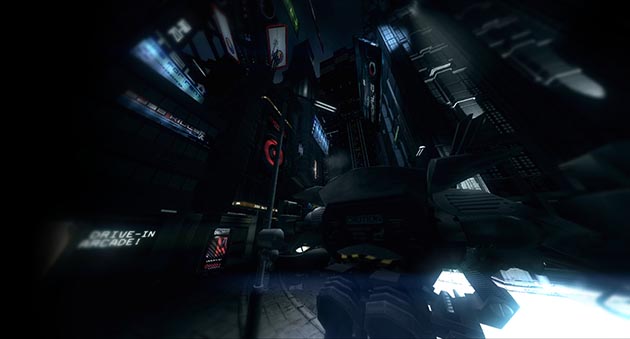 Technolust: The Short Film, also by Blair Renaud (with Williams serving as producer) is a very cool 3D-rendered experience ripped right from the pages of an 80s Cyberpunk novel. This is also a trailer of sorts as the experience just throws a bunch of visuals at you while disembodied voices talk about the world of the near future. It feels dated but in a retro way, like if the VR pioneers of the 90s had started rendering it on the first go around and it just finished in time for the new VR revolution. It also employs an interesting method of constantly moving the camera slowly forward as if you were on a funhouse ride. It will be exciting to see where this goes once it's possible to really dig into a story.
Technolust: The Short Film, also by Blair Renaud (with Williams serving as producer) is a very cool 3D-rendered experience ripped right from the pages of an 80s Cyberpunk novel. This is also a trailer of sorts as the experience just throws a bunch of visuals at you while disembodied voices talk about the world of the near future. It feels dated but in a retro way, like if the VR pioneers of the 90s had started rendering it on the first go around and it just finished in time for the new VR revolution. It also employs an interesting method of constantly moving the camera slowly forward as if you were on a funhouse ride. It will be exciting to see where this goes once it's possible to really dig into a story.
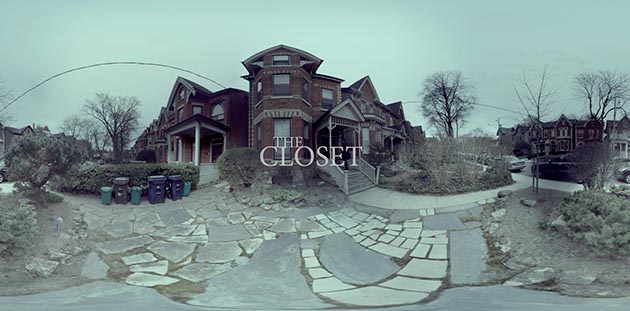 Ian Tuason's The Closet is a 360-video live action allegorical short that does a few things right and few things that will make you scratch your head. There are some fun genre elements and it's nice to see a piece that stands alone as its own short story (clocking in at about five-and-a-half minutes). The experience has an omnipresent camera that uses hard cuts to move around an apartment. Some of these cuts/moves felt unmotivated but it has a nice pay off at its conclusion.
Ian Tuason's The Closet is a 360-video live action allegorical short that does a few things right and few things that will make you scratch your head. There are some fun genre elements and it's nice to see a piece that stands alone as its own short story (clocking in at about five-and-a-half minutes). The experience has an omnipresent camera that uses hard cuts to move around an apartment. Some of these cuts/moves felt unmotivated but it has a nice pay off at its conclusion.
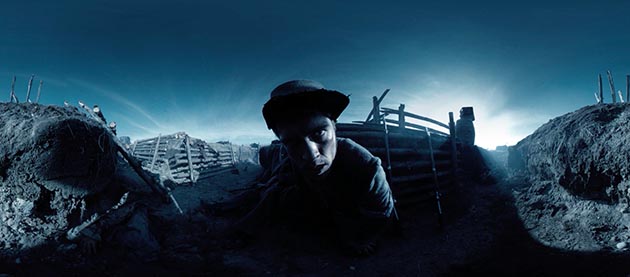 Also making use of live action 360-video is Brian Rice, Tristan Cezair, and Andrew MacDonald's War of the Dead. This ambitious sub-five-minute narrative short is the story of two Civil War soldier that stumble in a pack of Zombies. It's fun and stylized and well put together. The video uses a desaturated filter that gives is a creepy tone (they also have a version with an even more stylized color tone to it) and there are some interesting camera movements, but it's pretty obvious we still have a good ways to go until we know how to tell these kind of stories in full immersion.
Also making use of live action 360-video is Brian Rice, Tristan Cezair, and Andrew MacDonald's War of the Dead. This ambitious sub-five-minute narrative short is the story of two Civil War soldier that stumble in a pack of Zombies. It's fun and stylized and well put together. The video uses a desaturated filter that gives is a creepy tone (they also have a version with an even more stylized color tone to it) and there are some interesting camera movements, but it's pretty obvious we still have a good ways to go until we know how to tell these kind of stories in full immersion.
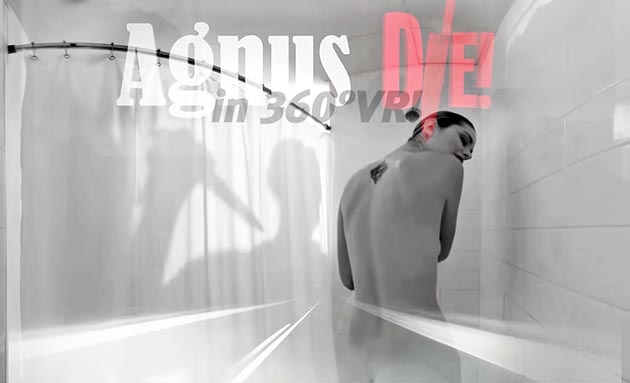 Also by MacDonald and Cezair is one of the most successful VR narrative pieces yet. Agnus Die is an ode to Hitchcock that the filmmakers were showing at Next (though not officially part of the Canadian Genre lineup). The piece uses a few very cool techniques including 3D-rendered elements and some interesting monochromatic color play. It's very short but very well executed (and throwing in some nudity can't hurt from bringing in the eyeballs).
Also by MacDonald and Cezair is one of the most successful VR narrative pieces yet. Agnus Die is an ode to Hitchcock that the filmmakers were showing at Next (though not officially part of the Canadian Genre lineup). The piece uses a few very cool techniques including 3D-rendered elements and some interesting monochromatic color play. It's very short but very well executed (and throwing in some nudity can't hurt from bringing in the eyeballs).
All in all, the Cannes Next lineup was another step forward in film festival exhibition of VR. It also served as a fantastic place to get the best minds working in VR content creation together to talk about what's working and what we still need to figure out. There is a lot of room to grow in how we tell stories in VR and it's nice to see that Cannes will be a place to help move this conversation forward.
Sync screening photo credit: Joshua Sobel







